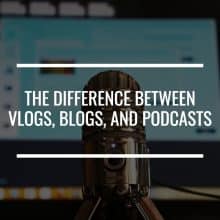

Vlogs, blogs, and podcasts each have their own success stories. Many people have “made it” with each content format and are now regularly earning hundreds of thousands of dollars.
But what exactly makes them different from each other?
Vlog stands for “video blog.” YouTube is, without-a-doubt, the superior platform when it comes to vlogs or (any other type of video content) because it offers users a platform that’s unparalleled when it comes to video marketing.
YouTube has 2 million monthly-active users. That means 2 million people actively log in each month. This trend is expected to increase in the coming years.
87% of businesses claim that they use video as a marketing tool. Moreso, 79% of customers admit that a brand’s video convinced them to make a final purchase. These statistics are why more and more internet marketers are turning to vlogs.
But is vlogging for you?
If you possess decent interpersonal communication skills, don’t mind speaking to a camera for hours, and are skilled in video editing, vlogging may be right up your alley.
Be aware, though – vlogging can get quite expensive. Vloggers require a camera that’s light, high-quality, durable, and portable. A camera like that can sometimes make or break the bank. Plus, you’ll need a laptop that’s quite powerful and can handle video editing well. What camera and laptop to buy will, of course, depend on the niche.
Vlogs also require a large time investment. From shooting (sometimes in multiple takes) to editing the actual video, vlogging is the most time-consuming compared to podcasts and blogs.
A blog is a discussion or informational website published on the internet, consisting of often informal diary-style written content, that’s been around since the internet’s inception (in 1999 there were 23 blogs on the internet). Since then, the practice has become more sophisticated, with businesses leveraging blogs to increase audience engagement.
Blogging is a good option for anyone who is able to write and organize their thoughts in a way that’s easily understood.
Blogs also require the lowest startup-costs. You can start a blog for as low as just $60, assuming that you already have a stable internet connection and functioning laptop.
One of the greatest blogging myths is that “blogging is dead” – but that’s simply not true. Blogging is alive and well, and still one of the best forms of evergreen content marketing.
Blogging is evolving. Most currently established blog sites could be considered full-fledged websites because they feature more than blog posts; they feature resources pages, educational content and tend to be more structured than the blogs of yesteryear.
Unlike a video or a blog post, a podcast eliminates the visual element from the equation. The result is a piece of content that’s the most passive for an audience to consume.
A U.S. survey conducted in 2019 discovered that 51% of consumers above the age of twelve listen to podcasts. People listen to podcasts while driving, cleaning, or unwinding after a long day.
These shows are similar to radio programs and can be informative, entertaining, or both. The length of a podcast episode can range anywhere from 15 minutes to an hour, and each podcast consists of episodes that can be downloaded on a weekly basis.
In the beginning of 2020, there were 850,000 active podcasts and more than 30 million podcast episodes that were uploaded. Although these numbers are lower than the number of active blogs and vlogs, there’s a silver lining — less competition. One of the biggest opportunities podcasts can give an aspiring internet marketer is the ability to pick virtually almost any niche imaginable.
A podcast is a good option for someone with exceptional storytelling abilities. Keep in mind that episodes should be well-thought out because visual aids don’t exist to guide your listeners along in this format.
Starting a podcast requires its own set of equipment, though (like a condenser mic). Although a high-end laptop isn’t required, you’ll need something reliable. And since most people don’t have the equipment or software necessary to record and edit audio, the starting investment can become costly.
The main difference between these three types of content is how they’re presented. Vlogs rely on videos, blogs rely on text, and podcasts rely on audio.
Choosing which path to pursue will greatly depend on what you’re most comfortable with and where your strengths lie. Vlogs, blogs, and podcasts can all be lucrative in their own way.
So, which avenue is the best? That’s for you to decide.
I've been in internet marketing for over 10 years, and I've purchased dozens of illegitimate products for the sole purpose of evaluating them and exposing the truth about these products to anyone who's thinking about purchasing it. I never let money influence my rating of a product and your success/safety is my absolute highest priority. Don't want to buy a product? Register for one of my 100% free internet marketing training courses>>